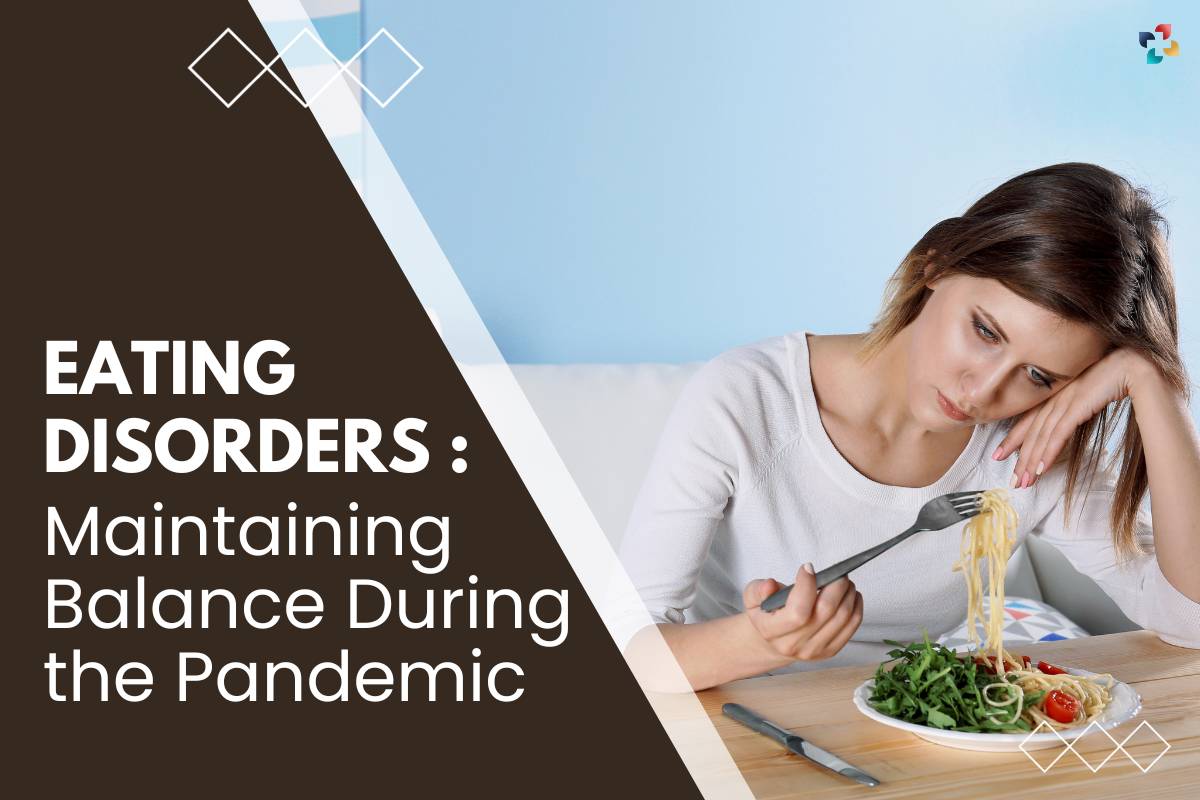The pandemic of COVID-19 has had a significant impact on nearly every aspect of our lives. The micro effect of the pandemic is such that right from the way we all work and socialize, and the way we have access to healthcare have all changed greatly. There are a number of ways it has affected our health, and individuals have faced a myriad of health challenges. One prominent among them is dealing with eating disorders.
For people already on the path to recovery or for those who are struggling with any kind of eating disorder, the effect of the pandemic on one’s daily life, mental health, and proper access to support can be scary.
In this article, we will explore the impact of the COVID-19 pandemic on individuals with eating disorders, provide advice for maintaining balance and recovery, and highlight the importance of support systems and professional help in these trying times.
The Pandemic and Eating Disorders: A Complex Relationship
The pandemic’s influence on eating disorders is multifaceted. Several factors have converged to create an environment that can exacerbate eating disorders or lead to their development.
1. Isolation and Loneliness
The lockdowns, social distancing measures, and isolation have been challenging for individuals who rely on support from friends and family. The loss of in-person connections can heighten feelings of loneliness and disconnection, which may trigger or worsen disordered eating behaviors.
2. Disrupted Routines
The pandemic has upended daily routines and introduced uncertainty into many aspects of life. For individuals in recovery from eating disorders, a structured daily schedule can be crucial for maintaining progress. Disruptions in routines can trigger anxiety and exacerbate disordered eating patterns.
3. Anxiety and Stress

The pandemic has created a climate of heightened stress and uncertainty. Many individuals are dealing with financial worries, health concerns, and the challenges of remote work or online learning. Increased anxiety and stress can lead to emotional eating, binge eating, or a loss of appetite, depending on the individual.
4. Food Scarcity and Hoarding
In the early stages of the pandemic, concerns about food scarcity led to hoarding behaviors. This could trigger anxiety in individuals with eating disorders, especially for those who have experienced food scarcity or fear related to certain foods.
5. Telehealth Challenges
While telehealth has been instrumental in providing access to healthcare during the pandemic, it may present challenges for individuals with eating disorders. Some may find it difficult to engage in therapy or medical appointments remotely.
6. Limited Physical Activity
With gyms closed or operating under restrictions, individuals who used exercise as part of their coping mechanism or in a way that contributed to their eating disorder may be struggling to find alternatives.
7. Triggers in Media
News about the pandemic, combined with the omnipresence of social media, can expose individuals to triggering content related to food, exercise, and body image. This constant exposure to unhealthy ideals and fad diets can contribute to disordered eating behaviors.
Maintaining Balance and Recovery
Although the pandemic presents unique challenges, it is essential to remember that recovery from an eating disorder is possible. Here are some strategies to help individuals maintain balance and work toward recovery during these uncertain times:
1. Establish a Routine
Try to maintain a daily schedule that includes regular meals, snacks, and sleep patterns. A structured routine can provide stability and help prevent disordered eating behaviors.
2. Stay Connected
While in-person interactions may be limited, stay connected with friends, family, and support networks through virtual means. Virtual support groups or therapy sessions can be beneficial.
3. Seek Professional Help
If you are struggling with an eating disorder or disordered eating behaviors, it’s important to seek professional help. Many therapists and counselors now offer telehealth services, making it easier to access support.
4. Limit Exposure to Triggers
Be mindful of the content you consume, especially on social media. Unfollow or mute accounts that promote unhealthy ideals, and consider taking breaks from the news or certain media platforms.
5. Practice Mindfulness
Mindfulness techniques, such as meditation and deep breathing exercises, can help manage anxiety and stress. These practices can be particularly helpful during challenging moments.
6. Engage in At-Home Activities
Find enjoyable activities to replace or supplement exercise routines that may have been disrupted. Arts and crafts, puzzles, reading, or even cooking can be enjoyable and distracting.
7. Avoid Comparisons
Remember that everyone’s experience during the pandemic is unique. Try not to compare yourself to others, whether it’s regarding productivity, body changes, or eating habits.
8. Self-Compassion:
Practice self-compassion and self-acceptance. Understand that the pandemic is a difficult time, and it’s okay to have moments of struggle or imperfection.
The Importance of Support

For individuals with eating disorders, the support of friends, family, and healthcare providers is invaluable. Loved ones can play a significant role in assisting individuals in their recovery journey. Here are some tips for supporting someone with an eating disorder during the pandemic:
1. Be Non-Judgmental
Approach conversations with empathy, and avoid making judgments or offering unsolicited advice. Remember that eating disorders are complex, and recovery is a gradual process.
2. Encourage Open Communication
Create a safe space for open and honest conversations about feelings, challenges, and concerns. Let your loved one know that you are there to listen and support them.
3. Respect Their Agency
Individuals with eating disorders should be actively involved in their recovery. Respect their autonomy and choices while providing guidance and encouragement.
4. Educate Yourself
Learn about eating disorders and their complexities. Understanding the condition will enable you to provide more effective support.
5. Avoid Commenting on Appearance
Avoid making comments about your loved one’s body or appearance, even if you believe it to be complimentary. Instead, focus on their well-being and feelings.
6. Encourage Professional Help
Encourage your loved one to seek professional assistance, such as therapy or counseling. Offer to help them find a suitable therapist or treatment program.
7. Participate in Meal Planning
If appropriate and with your loved one’s consent, participate in meal planning and preparation to ensure that they are receiving proper nutrition.
8. Offer Emotional Support
Eating disorders can be emotionally distressing. Offer emotional support and comfort during difficult moments.
Accessing Professional Help

For individuals struggling with eating disorders, accessing professional help is a crucial step in their recovery journey. The pandemic has brought about changes in the way mental healthcare is delivered, with many therapists and treatment centers offering telehealth services. Here’s how to go about seeking professional help:
1. Research Therapists
Begin by researching therapists who specialize in eating disorders. Look for professionals who offer telehealth services and are experienced in treating these conditions.
2. Verify Insurance Coverage
Check your insurance plan to understand the coverage for mental health services, including telehealth appointments. This will help you determine the financial aspect of treatment.
3. Contact Potential Therapists
Reach out to potential therapists to inquire about their availability, approach to treatment, and any specific programs they offer for eating disorders.
4. Initial Consultation
Schedule an initial consultation or appointment with a therapist to discuss your or your loved one’s needs and goals. This meeting will help determine if the therapist is a good fit.
5. Treatment Plan
Work with the therapist to develop a personalized treatment plan that may include therapy, medical evaluations, nutritional guidance, and support from other professionals.
6. Support Groups
In addition to individual therapy, consider joining virtual support groups or online communities dedicated to eating disorder recovery.
Conclusion
In conclusion, the pandemic of COVID-19 has presented particular challenges for people with eating disorders. Additionally, the combination of isolation, stress, and disturbed routines have made matters worse. However, sitting down and drowning in worry is not the solution to these problems. Implementing the right strategies, finding the right support systems, and seeking professional help, it is indeed possible for people to maintain a balance and continue their journey to recovery.
For those who suspect they have developed an eating disorder during this time, seeking help is a vital first step towards healing and well-being. It is essential to remember that recovery is possible, even in the face of challenging circumstances.











